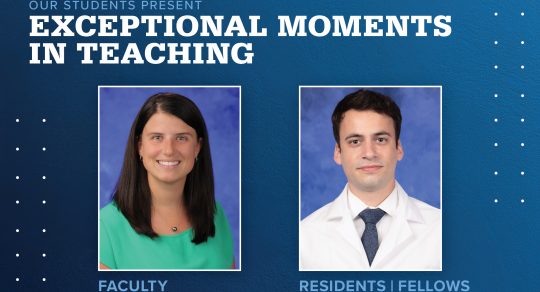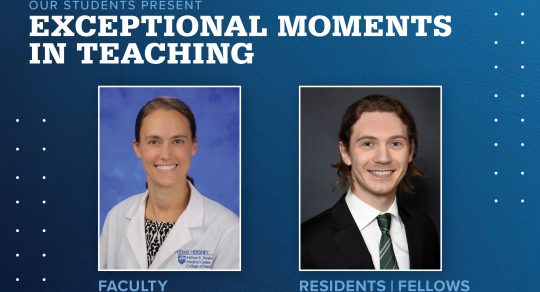Fellowship
Surgical Critical Care
The Surgical Critical Care Fellowship at Penn State Health Milton S. Hershey Medical Center is a one-year, ACGME-approved program that admits one fellow per year.
Explore More
The Surgical Critical Care Fellowship is designed to train leaders in academic surgical critical care through an intensive clinical and educational experience. Successful completion of this fellowship will satisfy the American Board of Surgery requirements for obtaining the Certification of Added Qualifications in Surgical Critical Care. A variety of clinical experiences will be offered, including rotations with thoracic, vascular and hepatobiliary. There is an opportunity for an international rotation to facilitate the educational process with a diverse patient population.
Learn More about the Fellowship
General Application Information
All applications for the Surgical Critical Care Fellowship must be submitted through the SCC and ACS Fellowship Application Service (SAFAS).
With questions on the application process, email sccfellowship@pennstatehealth.psu.edu.
Prerequisites
Qualified applicants should meet the following prerequisites:
Completion of at least three years of training in an ACGME-approved general surgery, neurosurgery, urology or obstetrics and gynecology residency program
Established ability as a teacher of medical students
Current Fellow

PGY-6 Fellow, Surgical Critical Care Fellowship
Leadership

Program Coordinator, Acute Care Surgery Fellowship, Surgical Critical Care Fellowship and Thoracic Surgery Fellowship, Surgery
Supporting Your Training
Program Goals and Objectives
Understand pathophysiology associated with different causes of hemodynamic instability. Examples include types of shock, cardiac arrest.
Utilize advanced technology (ECHO and ultrasound) to optimize patient care. Insert pulmonary artery, central venous and arterial lines and obtain hemodynamic data; interpret data and initiate therapy. Instruct junior residents in insertion of invasive monitors and interpretation of data. Resuscitate patients from shock and cardiac arrest.
Know and apply treatments for arrhythmias, congestive heart failure, acute ischemia and pulmonary edema.
Recognize and treat ischemia and arrhythmia on ECG. Utilize correct class of anti-arrhythmic, vasodilators and diuretics as they pertain to cardiac disease. Be able to interpret and instruct current ACLS guidelines.
Understand factors associated with assessment of preoperative surgical risk. Examples include evaluation of the high risk cardiac patient undergoing non- cardiac surgery.
Ability to assess preoperative risk based on history, physical exam, laboratory and radiographic data. Correctly interpret data and optimize the high-risk cardiopulmonary patient for surgery.
Understand pathophysiology associated with respiratory failure.
Proficiency and ability to instruct in endotracheal intubation and tracheostomy through multiple routes. Interpret arterial blood gas analysis and chest radiography and institute appropriate therapy. Use of diagnostic and therapeutic bronchoscopy.
Understand pathophysiology, indications for, and complications associated with various modes of mechanical ventilation. Examples include ventilator management of ALI, ARDS, and thoracic traumas well as weaning form ventilator support.
Ventilator management in common surgical disease. Ability to set up initial and advanced ventilator settings including salvage modes. Ability to treat common complications of mechanical ventilation including tube thoracostomy. Ability to wean from ventiliatory support.
Understand adjuncts to the analysis of respiratory mechanics and gas exchange. Examples include work of breathing, rapid shallow breathing index, single breath CO2 analysis and dead space measurements.
Appropriately use adjuncts to assist in the management of ventilated patients. Interpretation of work of breathing, dead space measurements and institute therapy based on determination. Use of pressure/volume curves and other computer graphics.
Understand fluid and electrolyte as well as acid/base abnormalities associated with complex surgical procedures and complications. Examples include massive fluid shifts associated with trauma, shock and resuscitation, high output fistulas and renal failure.
Correctly evaluate patient’s volume status, interpret electrolyte and arterial blood gas analysis in the context of the underlying surgical disease or complication and initiate appropriate fluid therapy based on results. Instruct junior residents in the above.
Understand the pathophysiology of oliguria, anuria and acute renal failure. Understand the indications for and different modes of dialysis.
Correctly interpret volume and electrolyte status and determine cause of oliguria. Initiate appropriate pharmacological mode of dialysis when indicated.
Understand the role of hormones and cytokines in the graded metabolic response to injury, surgery and infection.
Correctly determine the protein, caloric, electrolyte, fat and vitamin needs of surgical patients, taking into account their underlying disease process. Instruct junior residents in fluid and electrolyte disorders in the SICU.
Understand the indications, routes and complications of administration of parenteral and enteral forms of nutrition.
Initiate appropriate nutritional support through the most optimal route. Manage complications of nutritional support. Examples include hyperglycemia. Perform and instruct junior residents in performance of bedside percutaneous gastrostomy.
Understand the pathophysiology associated with endocrine emergencies in the SICU. Examples include thyroid storm, hyper/hypoparathyroid states and adrenal insufficiency.
Correctly interpret physiologic and laboratory data associated with endocrine emergencies and initiate therapy.
Understand the mechanism of action as well as the spectrum of antimicrobial activity of the different antibiotic classes. Examples include cabapenams, extended spectrum penicillins and fluoroquinolones.
Consider the most likely microbial pathogen and select the correct empiric antibiotic. Interpret culture and sensitivity data when available and refine antibiotic choice.
Understand the risk factors that result in multiply resistant organisms. Examples include antibiotic dosing, antibiotic synergy and transmission patterns.
Utilize pharmokinetics and drug levels to adjust antibiotic dosing. Utilize appropriated combinations of antibiotics to achieve synergy. Appropriately utilize isolation precautions.
Understand the risk factors and common pathogens that are associated with nosocomial infections.
Identify and minimize factors associated with nosocomial infections. Instruct junior residents in sterile techniques and application of maximum barrier precautions. Utilize appropriate adjunctive measures to diagnose and treat nosocomial infection. Examples include bronchoscopy to aid in the diagnosis of ventilator-associated pneumonia.
Understand the factors that result in an immunocompromised state. Examples include malignancy, major trauma and steroids.
Identify unique infections found in immunocompromised hosts and select appropriate antibiotic/antifungal therapy.
Understand the indications for, and complications of, blood component therapy.
Correctly diagnose and treat anemia and thrombocytopenia. Correctly diagnose and treat transfusion reactions. Appropriately use pharmacologic therapy to minimize the need for transfusion.
Understand the factors associated with bleeding disorders. Examples include DIC, ITP, hemophilia, coagulopathy associated with shock and hypothermia.
Correctly diagnose and treat coagulopathy associated with either acquired or congenital disease.
Understand the pathophysiology of traumatic brain injury. Examples include knowledge of intracranial pressure monitoring and maneuvers to normalize ICP.
Appropriately use intracranial pressure monitoring. Interpret hemodynamic ICP and cerebral metabolic data. Initiate therapy to maintain cerebral perfusion pressure and oxygenation and minimize secondary brain injury.
Understand the factors associated with altered mental status. Examples include traumatic, septic, metabolic and pharmacologic causes.
Correctly diagnoses and treat causes of altered mental status in the SICU.
Understand fluid compositions and the effect of the losses of such fluids as gastric, pancreatic and biliary from fistulas at various levels.
Correctly diagnose and treat complex fistulas arising from any place in the GI tract.
Understand the risk factors associated with stress gastritis.
Correctly utilize prophylaxis for stress gastritis in high risk SICU patients.
Understand the causes and treatment regimens for gastrointestinal bleeding. Examples include bleeding from upper and lower GI sources.
Correctly diagnoses and treat gastrointestinal bleeding associated with ulcers, portal hypertension and lower GI sources. Perform rigid sigmoidoscopy when indicated.
Understand the pathophysiology of hepatic failure.
Diagnose cause and appropriately alter treatment regimens to compensate for hepatic failure. Examples include altering fluid, protein and drug regimens. Performance of paracentesis with and without ultrasound guidance.
Understand end of life and legal and ethical issues. Examples include organ donation and withdrawal of support.
Work with family to respect patient’s end of life wishes, including withdrawal of care in a dignified manner. Work with the organ procurement organization (OPO) and trainees to coordinate care for organ donation.
Understand the role of surgeons in the SICU as well as the role of consultants.
Appropriately use consultants when indicated.
Understand the rationale for admission and discharge criteria in the SICU and cost implications of SICU care.
Appropriately admit and discharge critically ill and recovering patients as indicated.
Understand the mechanism and need for performance improvement
Take part in, and address, performance improvement issues.
Understand physiology of Obstetric and Gynecology patients requiring SIC U care including those with postpartum hemorrhage, pregnancy induced hypertension and obstetric conditions resulting in ARDS.
Collaboration with specialty residents to interpret fetal monitoring. Use advanced hemodynamic monitoring in obstetric patients.
Understand diagnostic modalities used in workup of the adult injured patient.
Resuscitation of injured patients, operative management under graded supervision.
Understand thermal, electrical, inhalation and immersion injuries.
Understanding injuries in and pathophysiology of multiply injured adolescent and pediatric patients.
Resuscitation of injured patients, operative management under graded supervision.
Understand descriptive and computational biostatistics and principles of experimental design and evidence based therapy.
Select and critique articles for monthly journal club. Complete a retrospective research project from administrative database.
Understand principles of pharmacokinetics and pharmacodynamics.
In collaboration with SICU pharmacist, prescribe medication dosed appropriately for organ function status.
Understand the use of specialty beds and device application.
Employ prone therapy as salvage modality in ARDS. Apply pelvic binder for hemorrhagic control.
General Contact Information
Mailing Address
Surgical Critical Care Fellowship
Penn State Health Milton S. Hershey Medical Center
500 University Dr., MC H075
Hershey, PA 17033-0850




